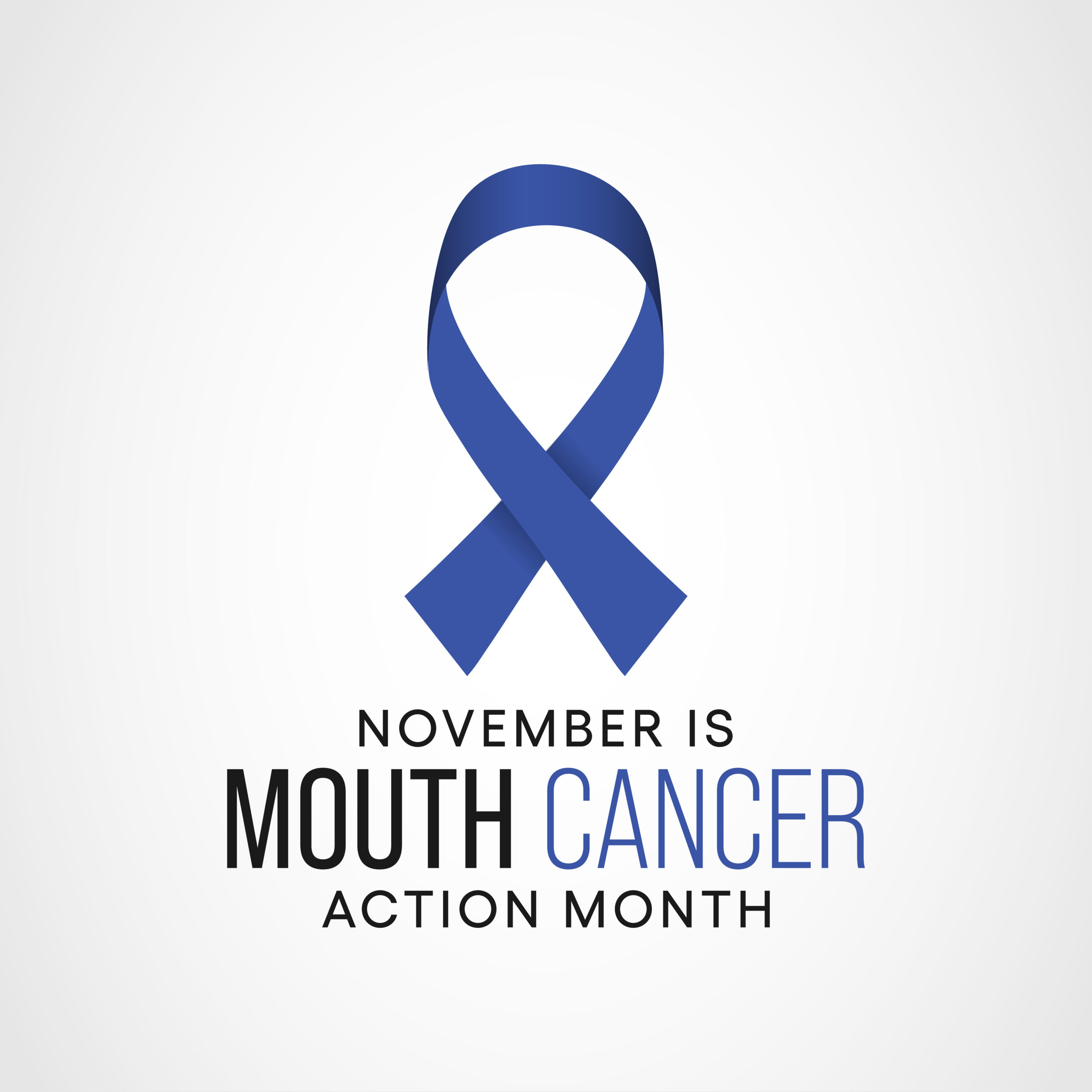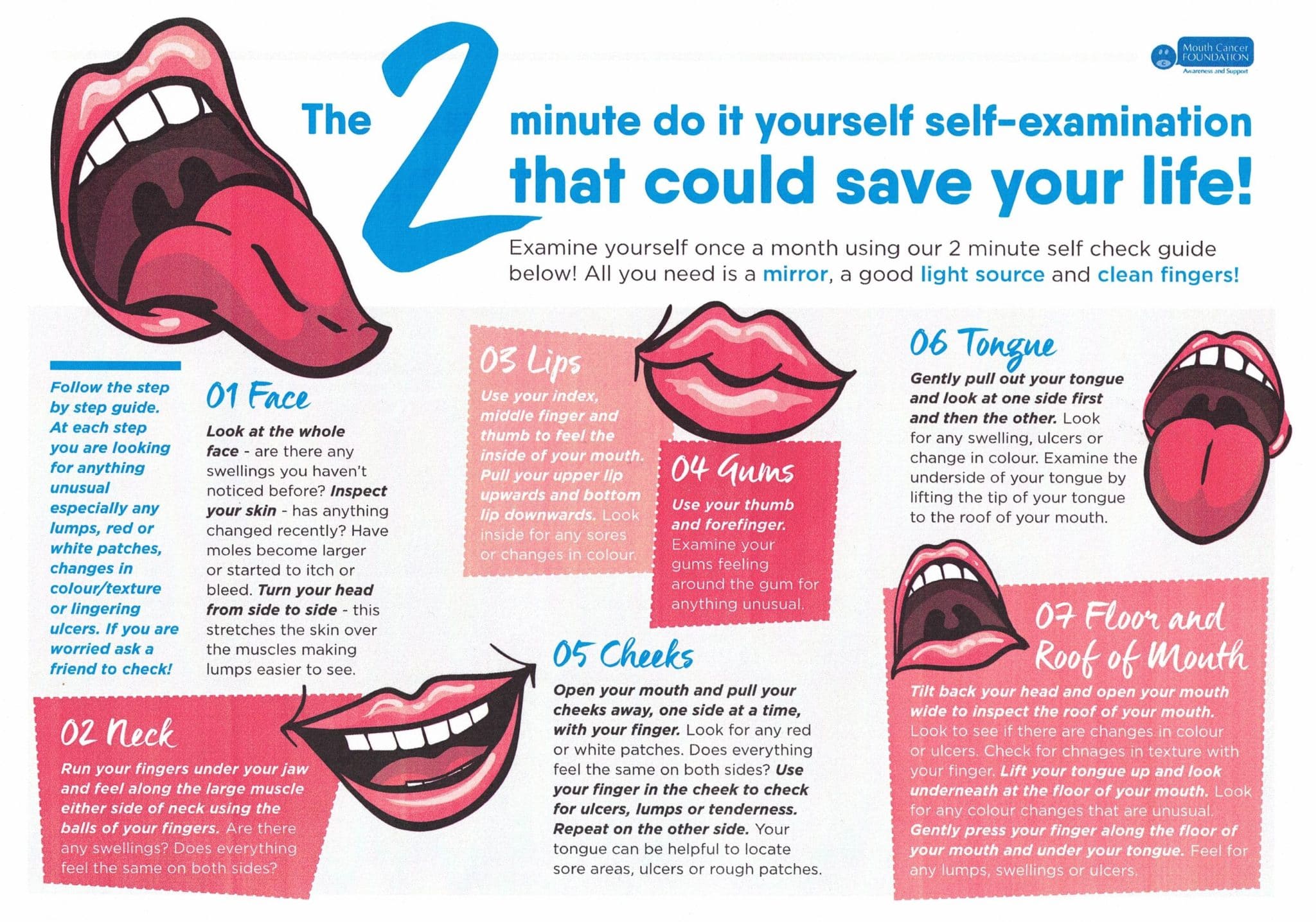What is an oral cancer screening and why consider one?
Mouth Cancer incidences have risen by 49% in the last 10 years and as part of Mouth Cancer Action Month, we aim to help spread awareness about the disease, along with potential risk factors and oral cancer screening advice.
3034 people in the UK lost their lives to the disease in 2021, and a staggering 8864 people were diagnosed in the same year. The 10 year survival rate is between 15% and 57% depending on where the cancer strikes and how quickly it is diagnosed.
Mouth Cancer Action Month
Mouth Cancer Action Month is the UK’s biggest charity campaign for mouth cancer awareness and is supported by the Mouth Cancer Foundation and the Oral Health Foundation, who raise money for improving awareness and education around mouth cancer.

What is Mouth Cancer?
This is the general term given to the variety of malignant tumours that develop in the mouth, (oral cavity). The Mouth Cancer Foundation promotes awareness of all head and neck cancers i.e. throat (pharynx), voice box (larynx), salivary glands, nose, nasal, sinuses, lips and skin.
What is an oral screening?
Dentists typically carry out an oral screening during a routine dental check-up. It is a physical and visual examination of the oral cavity and connecting tissues. Oral screenings are completed to reassure patients that there are no problems, and to commence early treatment when there are.
Visual examination
Here at Montagu Dental, we will pay attention to the entire oral cavity as well as the: neck, face, lips and nose. The visual assessment will look for any lumps, swellings and patches of discolouration that are abnormal, as well as ulcerations. The tongue will be gently held down with small stick called a tongue compressor, and a light will be used to assess the back of the mouth and throat. The inner cheeks, roof of the mouth and under the tongue will also be checked.
Physical examination
Your dentist will also touch your face, mouth, and neck to feel for any unusual nodules or masses. Touch is imperative for them to find any cancer-causing abnormalities in your mouth. While oral cancer symptoms can sometimes be painful, it is usually painless in its early stages. This is even more of a reason for dental professionals to screen for it regularly, and why you should attend check-ups often.
How do I book an oral screening?
An oral screening can be suggested by your dentist depending on lifestyle factors, or you can simply request one as a precaution, or depending on your family history.
Please contact us if you wish to book a dental check-up and oral screening.
Mouth Cancer risk factors
We don’t know what causes most mouth cancers. However, there are several factors that are likely to increase your risk.
Up to 90% of all mouth cancers are linked to lifestyle factors.
This means that with a few small changes, you can help cut your chances of developing mouth cancer.
If you do not stop or reduce the things that might put you at greater risk, it is important that you do self-checks at home and regularly visit your dentist.
If any or most of these apply to you, it does not mean that you are certain to develop mouth cancer.
The below causes are linked to mouth cancer.
Smoking
Smoking tobacco increases your risk of developing mouth cancer by up to ten times, compared with never-smokers. This includes smoking cigarettes, pipes or cigars.
Around two in every three (more than 60%) mouth cancers are linked to smoking.
There is also evidence that second-hand smoke at home or in the workplace may increase a person’s risk of mouth cancer.
Alcohol
Drinking alcohol to excess increases your risk of mouth cancer. Alcohol is linked to just under a third (30%) of all mouth cancers.
Smoking and drinking together trebles a person’s mouth cancer risk.
UK guidelines recommend a maximum of 14 units of alcohol a week for both men and women.
HPV
Many recent reports have linked mouth cancer to the human papillomavirus (HPV).
HPV is the major cause of cervical cancer and affects the skin that lines the moist areas of the body. HPV can be spread through oral sex, and research suggests that it could soon rival smoking and drinking as one of the main causes of mouth cancer.
Practicing safe sex and limiting the number of partners you have may help reduce your chances of contracting HPV.
There are now HPV vaccines for both girls and boys. They were developed to fight cervical cancer, but it is likely that they will also help to reduce the rates of mouth cancer. These vaccines are given at age 12 to 13 before sexual activity starts.
Chewing and smokeless tobacco
Smokeless tobacco is any tobacco product that is placed in the mouth or nose and not burned.
Chewing and smokeless tobacco is extremely harmful and can significantly increase a person’s risk of being diagnosed with mouth cancer.
The types of smokeless tobacco products most used contain a mix of ingredients including slaked lime, areca nut and spices, flavourings and sweeteners.
The terminology for smokeless tobacco varies, but the main types used in the UK include:
- Gutka, Khaini, Pan Masala (betel quid), Shammah and Maras powder (these are sucked or chewed);
- Zarda, Qiwam, or Mawa (chewed);
- Lal dantmanjan, Gadakhu, Gul, Mishri, or Creamy Snuff (dental products which are used as toothpaste or rubbed on gums);
- Nass (can be used nasally, sucked or chewed).
Smokeless tobacco is often popular with South Asian communities.
Diet
Around a third of mouth cancers are thought to be linked to an unhealthy diet and a lack of vitamins and minerals.
It is recommended that you eat a healthy, balanced diet including lots of fruit and vegetables each day.
Increasing evidence also suggests that Omega 3, found in foods such as eggs and fish, can help lower your risk. Foods high in fibre such as nuts, seeds, whole-wheat pasta and brown rice, are also said to do the same.
A healthy diet will also promote better overall dental hygiene.
Sunlight and sun-beds
Too much ultraviolet (UV) radiation is a known cause of skin cancer. This can occur either from natural sunlight or sun-beds.
Skin cancer can develop on the lips – as this area is often exposed to UV radiation.
Cancer history
Those who have had a mouth cancer are at greater risk of developing it again.
There are also other cancers which can mean a person is more likely to get mouth cancer. These include:
- Oesophagus cancer (of the food pipe)
- Squamous cell skin cancer
- Cervical cancer
- Penile cancer
- Anal cancer
Family history, genetics and the immune system
Although we do not know why, there is a slight increase in risk of mouth cancer if you have a close relative diagnosed with the disease.
Mouth cancer can also be more likely for those who carry certain inherited genes. Links have been found for those with genetic conditions affecting the bone marrow, skin or fingernails.
Research also shows those undergoing treatment for HIV or AIDS, and those taking medication after organ transplants are slightly more at risk of mouth cancer. This is because some of the medication in these cases can weaken the immune system.
Mouth Cancer Facts and Figures
- 1 person every 3 HOURS is lost to Mouth Cancer.
- 8864 people in the UK were diagnosed with Mouth Cancer last year.
- Last year 3034 people in the UK lost their life to Mouth Cancer.
- Worldwide Mouth Cancer affects 650,000 per year.
- Mouth Cancer is TWICE as common in men than women, though an increasing number of women are being diagnosed with the disease.
- 58% of mouth cancers appear on the tongue and tonsils.
- 78% of cases occur in the Over 55 age group.
- The ten-year survival rate is between 18% and 57%, depending on where the cancer strikes and how early it is diagnosed.
- Incidence has risen by 49% over the past 10 years.
- 5 year SURVIVAL rate has hardly improved in last few decades due to late detection.
- 25% of mouth cancer cases have no associated significant risk factors.
- More people in the UK die each year of mouth cancer than of cervical and testicular cancer combined.
- Mouth cancer causes more deaths in the UK each year than road traffic accidents.
- Almost nine-in-ten (88%) UK adults have now heard of mouth cancer. However, awareness on the signs, symptoms and risk factors is poor.
- Awareness of the major signs and symptoms for mouth cancer are as low as 17%.
- Awareness on the major risk factors of mouth cancer is as low as 9%.
- Improving access to NHS dentistry, tackling late diagnosis, and protecting public health policies are some of the key challenges in confronting mouth cancer.
- It is important for all patients to have good access to dental care pre and post treatment.
Mouth Cancer Self-examination
You can also do a simple mouth cancer check at home. Please follow the steps in the picture below to take you through the steps.
Please contact us if you wish to book a dental check-up and oral screening.



